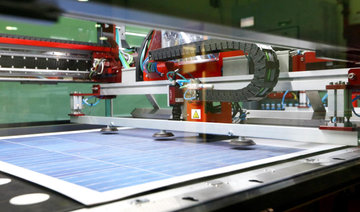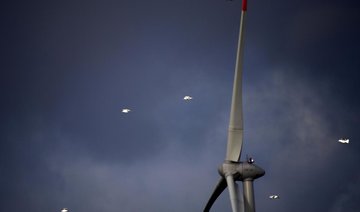London: In an exclusive interview with Arab News, Turki Mohammed Al-Shehri explains how an expanding renewables industry will boost employment as well as pave the way for a greener future.
A massive investment drive in green energy projects across Saudi Arabia is about creating jobs as well as diversifying the energy mix away from oil, according to the Kingdom’s renewables chief.
Last week Saudi Arabia revealed ambitious plans to produce 200 gigawatts of solar power by 2030, helping the country become a leading exporter of sustainable energy.
In an exclusive interview with Arab News, Turki Mohammed Al-Shehri, head of Saudi Arabia’s Renewable Energy Project Development Office (Repdo), said jobs and “local content” are guiding principles of the Kingdom’s renewables program. 
“A fundamental cornerstone of these projects will be local content. Local content is key — it is being stipulated in tenders,” said Al-Shehri in an interview in London.
He said: “The idea is that the products and components that are used in these farms (turbines, panels, hoists and other parts) are brought in from local factories, and the idea is to grow the industry organically; we want local factories to also export outside the Kingdom, ensuring the creation of jobs, and this will make sure that everything that is built in the Kingdom will be on a competitive global basis.”
Al-Shehri told Bloomberg in January that eight renewables tenders would be issued this year for 4.125 gigawatts of capacity at a cost of between $5 billion and $7 billion.
Asked by Arab News if the Kingdom would also need foreign investment to develop the sector, Al-Shehri replied: “Due to the size of the projects, we do need foreign investment experience and know-how, yes.”
In terms of the nuts and bolts of how renewable tenders would work, he pointed to the example of Riyadh-based Acwa Power, which recently won the contract to build the Kingdom’s first utility-scale solar photovoltaic plant.
“As long as they meet our local content requirement of 30 percent as well as other stipulations, where and how they source the technology is up to them,” he said. “The objective is to have an economic energy mix, driven by low-cost energy, and to ensure that local competitive industry is created in the Kingdom.”
By building up solar and wind-power generation, KSA will free up oil reserves for export, strengthening the country’s balance sheet.
Last week Crown Prince Mohammed bin Salman unveiled plans to develop the world’s biggest solar power project for $200 billion in partnership with Japan’s SoftBank.
The memorandum of understanding aims to produce up to 200 gigawatts of power by 2030 — about 100 times the capacity of the current biggest projects.
If built on one site, the solar farm would cover an area twice the size of Hong Kong, according to a Bloomberg News calculation.
Acwa Power CEO Paddy Padmanathan, who along with Al-Shehri attended London’s recent Saudi-UK CEO Forum, said: “Personally, I think they (renewables) could make up 40 percent of the (KSA) energy mix in 2030.”
Turning to his company’s success in February of being awarded the 300-megawatt PV solar project in Sakaka, Padmanathan said: “The tender was a rigorous, transparent process at a new world-record tariff and will set the foundation for a robust and competitive market for renewable energy in the Kingdom.”
The 25-year Sakaka power purchase contract was awarded to Acwa at a new world-record tariff of 8.781 halala/kWh (per kilowatt hour) (2.3417 cents/kWh). Middle Eastern oil producers are looking to renewables to meet growing domestic consumption and would rather export as much oil as possible to generate income to meet internationally recognized green energy standards, such as those in the Paris climate accord, while also reducing reliance on fossil fuels.
Saudi Arabia wants to deploy more natural gas, as well as solar and wind, to reduce its dependence on oil-based power generation. Developing a renewable energy industry is a key plank of Saudi Vision 2030.
The Sakaka plant, which Acwa has already started constructing in Al-Jawf province, is backed by a 25-year power purchase agreement with the Saudi Power Procurement Company.
Last year the Kingdom also tendered a 400 megawatt wind project — its first — at Dumat Al-Jandal, for which Repdo prequalified a number of companies in 2017.
In a recent interview with Arab News, Adnan Amin, director-general of the International Renewable Agency, said renewables were incredibly cheap now. “The latest bids for Saudi solar projects are around 2.5 US cents per kWh, which is about a quarter of the cost of oil,” he said.
Victoria Cuming, head of policy covering Europe, Middle East and Africa for Bloomberg New Energy Finance (BNEF), told Arab News: “Looking at the MENA region as a whole, renewables should both replace fossil fuel and add to the mix, as electricity demand will double by 2040, according to BNEF forecasts.”
She expected the region to see a significant shift in the capacity mix, from being 93 percent fossil fuels today to just under half renewables in 2040, according to BNEF’s New Energy Outlook 2017.
Cuming said: “In the near term, this will be mainly driven by incentives such as auctions, but in less than a decade the shift will be driven by the economics. Utility-scale PV plants are already cheaper than combined-cycle gas plants in net importing countries such as Egypt.”
Provided governments continue to phase out fossil-fuel subsidies, “this will be the case across MENA by 2025. Ten years later, onshore wind farms will be cheaper than gas,” said Cuming.
Green energy drive will boost KSA employment: Saudi Arabia’s renewable energy chief
Green energy drive will boost KSA employment: Saudi Arabia’s renewable energy chief

- Turki Mohammed Al-Shehri, head of Saudi Arabia’s Renewable Energy Project Development Office speaks to Arab News
- Crown Prince Mohammed bin Salman unveiled plans to develop the world’s biggest solar power project for $200 billion
First EU–Saudi roundtable on critical raw materials reflects shared policy commitment

RIYADH: The EU–Saudi Arabia Business and Investment Dialogue on Advancing Critical Raw Materials Value Chains, held in Riyadh as part of the Future Minerals Forum, brought together senior policymakers, industry leaders, and investors to advance strategic cooperation across critical raw materials value chains.
Organized under a Team Europe approach by the EU–GCC Cooperation on Green Transition Project, in coordination with the EU Delegation to Saudi Arabia, the European Chamber of Commerce in the Kingdom and in close cooperation with FMF, the dialogue provided a high-level platform to explore European actions under the EU Critical Raw Materials Act and ResourceEU alongside the Kingdom’s aspirations for minerals, industrial, and investment priorities.
This is in line with Saudi Vision 2030 and broader regional ambitions across the GCC, MENA, and Africa.
ResourceEU is the EU’s new strategic action plan, launched in late 2025, to secure a reliable supply of critical raw materials like lithium, rare earths, and cobalt, reducing dependency on single suppliers, such as China, by boosting domestic extraction, processing, recycling, stockpiling, and strategic partnerships with resource-rich nations.
The first ever EU–Saudi roundtable on critical raw materials was opened by the bloc’s Ambassador to the Kingdom, Christophe Farnaud, together with Saudi Deputy Minister for Mining Development Turki Al-Babtain, turning policy alignment into concrete cooperation.
Farnaud underlined the central role of international cooperation in the implementation of the EU’s critical raw materials policy framework.
“As the European Union advances the implementation of its Critical Raw Materials policy, international cooperation is indispensable to building secure, diversified, and sustainable value chains. Saudi Arabia is a key partner in this effort. This dialogue reflects our shared commitment to translate policy alignment into concrete business and investment cooperation that supports the green and digital transitions,” said the ambassador.
Discussions focused on strengthening resilient, diversified, and responsible CRM supply chains that are essential to the green and digital transitions.
Participants explored concrete opportunities for EU–Saudi cooperation across the full value chain, including exploration, mining, and processing and refining, as well as recycling, downstream manufacturing, and the mobilization of private investment and sustainable finance, underpinned by high environmental, social, and governance standards.
From the Saudi side, the dialogue was framed as a key contribution to the Kingdom’s industrial transformation and long-term economic diversification agenda under Vision 2030, with a strong focus on responsible resource development and global market integration.
“Developing globally competitive mineral hubs and sustainable value chains is a central pillar of Saudi Vision 2030 and the Kingdom’s industrial transformation. Our engagement with the European Union through this dialogue to strengthen upstream and downstream integration, attract high-quality investment, and advance responsible mining and processing. Enhanced cooperation with the EU, capitalizing on the demand dynamics of the EU Critical Raw Materials Act, will be key to delivering long-term value for both sides,” said Al-Babtain.
Valere Moutarlier, deputy director-general for European industry decarbonization, and directorate-general for the internal market, industry, entrepreneurship and SMEs at European Commission, said the EU Critical Raw Materials Act and ResourceEU provided a clear framework to strengthen Europe’s resilience while deepening its cooperation with international partners.
“Cooperation with Saudi Arabia is essential to advancing secure, sustainable, and diversified critical raw materials value chains. Dialogues such as this play a key role in translating policy ambitions into concrete industrial and investment cooperation,” she added.














